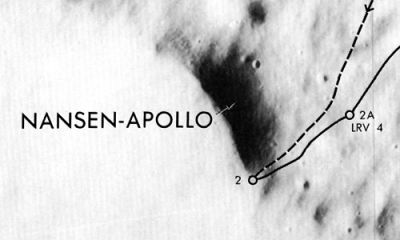Difference between revisions of "Nansen-Apollo"
| Line 5: | Line 5: | ||
Lat: 20.1°N, Long: 30.5°E, Diam: 1 km, Depth: km, [[R%C3%BCkl%2025|Rükl: 25]]<br /> | Lat: 20.1°N, Long: 30.5°E, Diam: 1 km, Depth: km, [[R%C3%BCkl%2025|Rükl: 25]]<br /> | ||
|} | |} | ||
| − | [[Image: | + | [[Image:Normal_Apollo_17_Nansen-Apollo_crater.JPG|external image normal_Apollo_17_Nansen-Apollo_crater.JPG]][http://www.lpi.usra.edu/resources/apollo/images/browse/AS17/137/20945.jpg [[Image:20945.jpg|external image 20945.jpg]]]<br /> <div id="toc"> |
Left: ''[http://lpod.org/coppermine/displayimage.php?pos=-2264 Apollo 17 Site Traverses Chart]'' The bright background and distorted shape is because Nansen-Apollo lies in the [[Light%20Mantle|Light Mantle]] formation at the base of [[South%20Massif|South Massif]] (on the right, where the words "Nansen-Apollo" are printed). Right: Color photo from ground: ''[http://www.lpi.usra.edu/resources/apollo/frame/?AS17-137-20945 Apollo Image Atlas]''. The large dark peak on the right, with the bright streak, near its base is [[North%20Massif|North Massif]]. The streak is [[Scarp|Scarp]]. The flat-topped peak to the left would appear to be [[Family%20Mountain|Family Mountain]].<br /> <br /> | Left: ''[http://lpod.org/coppermine/displayimage.php?pos=-2264 Apollo 17 Site Traverses Chart]'' The bright background and distorted shape is because Nansen-Apollo lies in the [[Light%20Mantle|Light Mantle]] formation at the base of [[South%20Massif|South Massif]] (on the right, where the words "Nansen-Apollo" are printed). Right: Color photo from ground: ''[http://www.lpi.usra.edu/resources/apollo/frame/?AS17-137-20945 Apollo Image Atlas]''. The large dark peak on the right, with the bright streak, near its base is [[North%20Massif|North Massif]]. The streak is [[Scarp|Scarp]]. The flat-topped peak to the left would appear to be [[Family%20Mountain|Family Mountain]].<br /> <br /> | ||
==Images== | ==Images== | ||
Revision as of 20:44, 15 April 2018
Contents
Nansen-Apollo (Apollo 17 site craterlet name)
|
Lat: 20.1°N, Long: 30.5°E, Diam: 1 km, Depth: km, Rükl: 25 |


Left: Apollo 17 Site Traverses Chart The bright background and distorted shape is because Nansen-Apollo lies in the Light Mantle formation at the base of South Massif (on the right, where the words "Nansen-Apollo" are printed). Right: Color photo from ground: Apollo Image Atlas. The large dark peak on the right, with the bright streak, near its base is North Massif. The streak is Scarp. The flat-topped peak to the left would appear to be Family Mountain.
Images
LPOD Photo Gallery Lunar Orbiter Images Apollo Images from air
- Apollo images from ground (Nansen-Apollo is Station 2 on EVA 2): Magazine C (137)
- Subtle colorations on boulder, at Station 2: AS17-137-20965 and AS17-137-20968 are two of a series of eleven close-up photographs of a colored boulder at Apollo 17's Station 2 (near Nansen-Apollo). Note the contrasting blue-grey and yellowish-grey colors! - DannyCaes Jan 29, 2008
Maps
(LAC zone 43D1) LAC map Geologic map LTO map Topophotomap Site Traverses chart
IAU page
Description
The Landing Site Name "Nansen-Apollo" is plotted on Topophotomap 43D1/S1 and Site Traverses chart 43D1S2. It has been described as a trough at the base of the South Massif.
Description: Wikipedia
Nansen-Apollo (correct link)
Additional Information
Nomenclature
- Astronaut-named feature, Apollo 17 site, approved in IAU Transactions XVIB (1976).
- Apollo 17 astronaut Harrison Schmitt recalled this crater was "named for Fridtjof Nansen (1861-1930), Norwegian Arctic explorer, statesman, and Nobel Peace Prize winner (1922). His studies of oceanography, meteorology, and nutrition underlay all future exploration work in the Arctic. Nansen represents the international character of all of mankind's exploration - past, present, and future." Perhaps unknown to the astronauts the 104-km diameter crater Nansen near the Moon's north pole had already been named for the same man. Hence the hyphenated suffix was added to distinguish this Nansen from the other.
LPOD Articles
Bibliography
David M. Harland: EXPLORING THE MOON; The Apollo Expeditions.
Eric M. Jones: APOLLO LUNAR SURFACE JOURNAL (ALSJ).